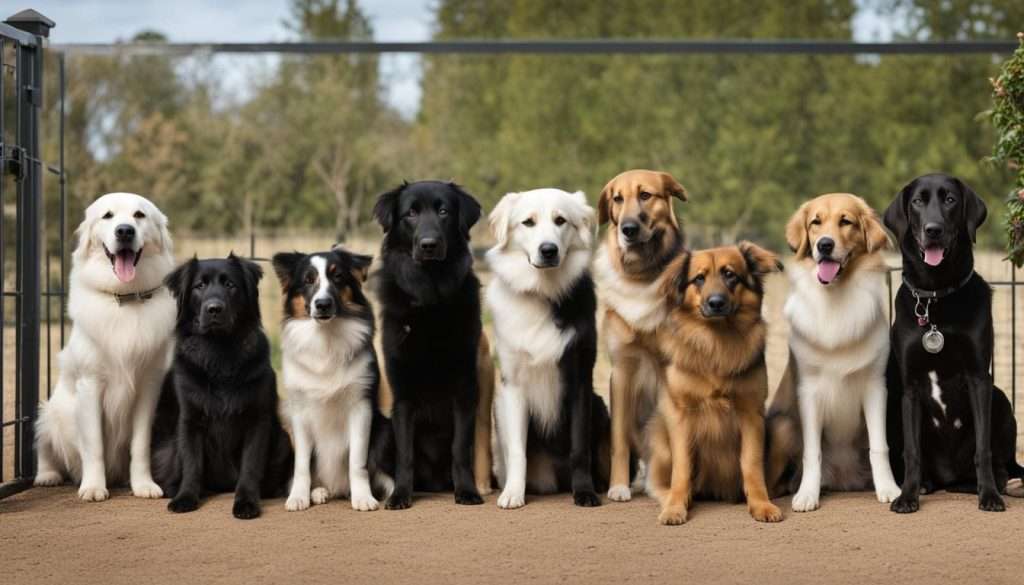When it comes to protecting your home and ensuring the safety of your loved ones, having a reliable security dog can make all the difference. These loyal and highly trained canines are not only effective deterrents, but they also provide a sense of security and peace of mind. Whether you’re looking for a dog to protect your property, safeguard your family, or accompany you on outdoor adventures, Australia’s Best Bodyguards offers a wide range of security dogs to suit your specific needs.
With 45 years of selective breeding and training, Australia’s Best Bodyguards specializes in Australian mastiffs, known for their toughness and intuitive nature. These dogs are experts at sensing danger and communicating through body language, making them exceptional guardians for your home. Raised and trained on a working farm, these mastiffs have the perfect temperament and ability to ensure your home security.
At Australia’s Best Bodyguards, you can choose from various types of security dogs, including personal protection dogs, family guard dogs, security patrol dogs, and even truffle detection dogs. No matter your specific security needs, their expertly trained canines will provide the utmost protection and companionship.
So, if you’re looking for the best dog for security, home safety, or any other specific purpose such as chicken protection, family protection, hunting and protection, farm protection, or even snake protection, Australia’s Best Bodyguards has you covered. Trust their expertise and find the perfect security dog to safeguard your home and loved ones.
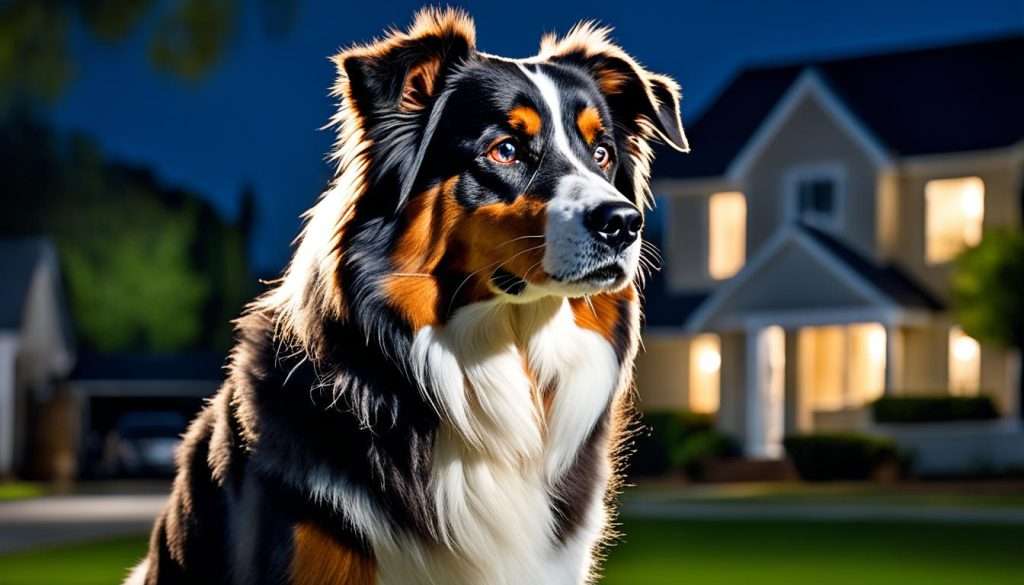
The Benefits of Having a Security Dog
Security dogs offer numerous advantages for home safety. Their natural protective instincts and unwavering loyalty make them exceptional guard dogs. With their acute senses, they can detect potential threats and intruders, providing early warning to their owners. The presence of a security dog instills a sense of security and peace of mind, knowing that they are prepared to protect their family and property. Furthermore, security dogs can be trained to fulfill specific tasks, such as:
- Chicken protection
- Family protection
- Hunting and protection
- Farm protection
- Snake protection
Whether it’s safeguarding your loved ones or securing your property, a security dog proves to be a valuable asset in defending against potential risks.
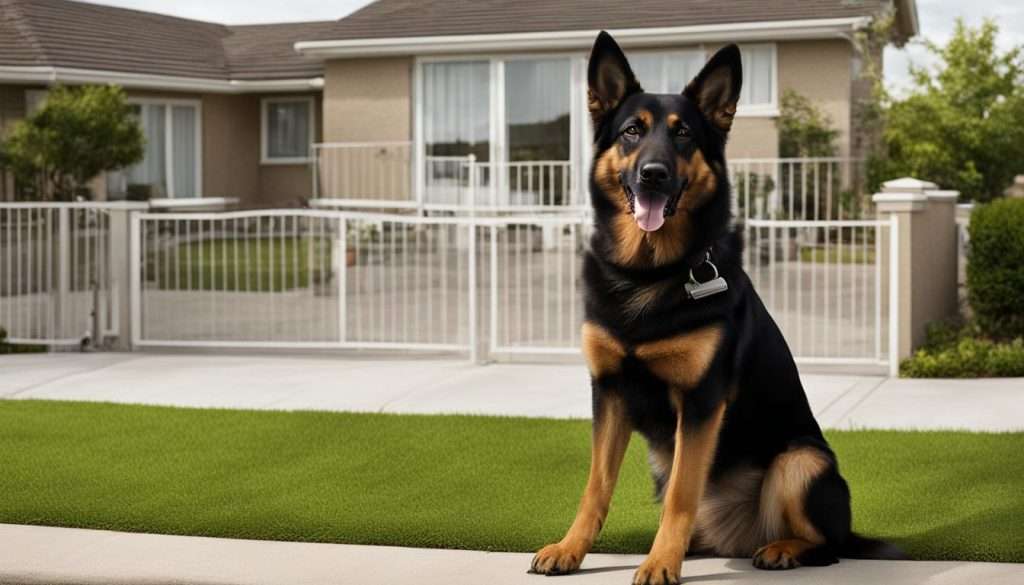
Having a security dog offers a range of advantages. Their inherent protective instincts, combined with training, enable them to serve as reliable companions for a safe and secure home environment.
Best Dog Breeds for Home Security in Australia
In Australia, there are several dog breeds that are highly regarded for their ability to provide exceptional home security. Whether you are looking for a loyal companion or a formidable guard dog, here are some of the best dog breeds to consider:
1. German Shepherd
The German Shepherd is renowned for its intelligence, obedience, and natural guarding instincts. They are incredibly versatile and can be trained to perform various tasks, making them an excellent choice for home security.
2. Rottweiler
Rottweilers are known for their loyalty and protective nature, making them excellent family guard dogs. With proper training and socialization, Rottweilers can be both gentle and loving towards their families while also deterring intruders with their imposing presence.
3. Bullmastiff
Bullmastiffs are powerful and imposing dogs that are incredibly loyal and affectionate towards their families. Despite their size, they are gentle giants who make excellent guard dogs, offering a perfect balance of protection and companionship.
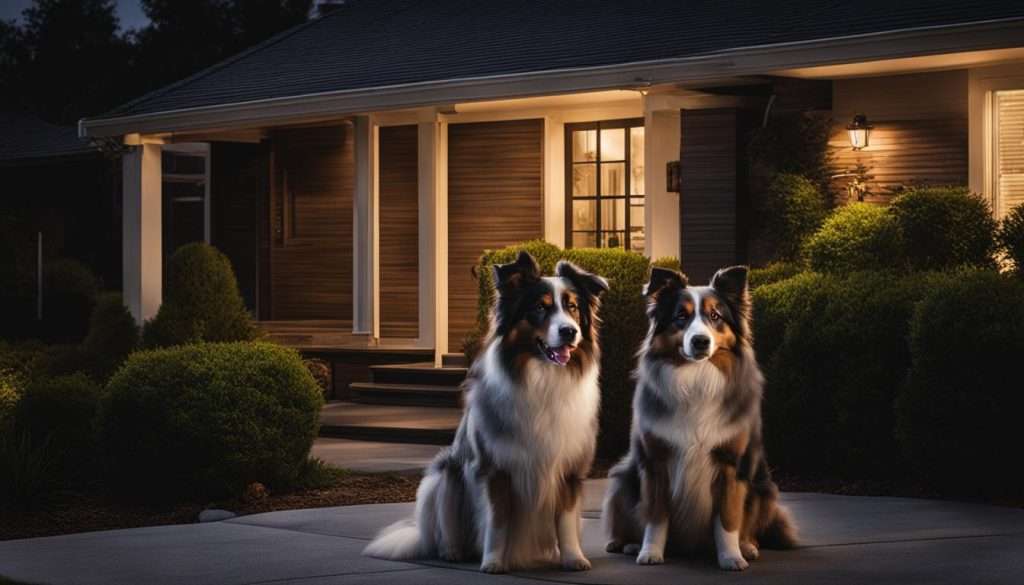
4. Akita
Akitas are known for their courage and loyalty, making them exceptional guard dogs. They form strong bonds with their families and will go to great lengths to protect their loved ones. Akitas require firm but gentle training to thrive as effective home security dogs.
5. Australian Shepherd
Australian Shepherds, despite their herding background, make great guard dogs with their high energy levels and innate protective instincts. These intelligent and energetic dogs excel at both safeguarding their territory and being a loyal companion.
When it comes to choosing the best dog breed for home security, it’s important to consider factors such as breed characteristics, temperament, and compatibility with your family and lifestyle. Each of these breeds has unique qualities that can make them an excellent choice for safeguarding your home and loved ones.
Training and Socialization for Security Dogs
Training and socialization are crucial for security dogs to become effective in their roles. Proper training ensures that they have the skills and knowledge to respond quickly and appropriately to potential threats, while socialization helps them interact with people and other animals without aggression. To train a security dog, it is important to focus on obedience training, bite skills development, and real-life scenario simulations.
Obedience training is the foundation for a well-trained security dog. It involves teaching them basic commands such as sit, stay, and come, and gradually progressing to more advanced commands like down, heel, and leave it. Consistency and positive reinforcement are key to successful obedience training. By reinforcing desired behaviors with rewards and praise, security dogs learn to listen, learn, and obey commands effectively.
Bite skills development is another essential aspect of training for security dogs. This training focuses on teaching dogs how to control their bite and use it as a deterrent without causing serious harm. Bite skills development involves teaching dogs to bite and release on command, as well as differentiating between real threats and innocent situations. Professional trainers use bite sleeves and decoys to simulate various scenarios and train security dogs to respond appropriately.
“Training a security dog involves teaching them obedience, bite skills, and real-life scenarios. Consistency and positive reinforcement are key to success.”
Simulating real-life situations is crucial to prepare security dogs for their roles. Trainers create scenarios that resemble potential threats or intrusions, teaching dogs how to react and respond in these situations. This can include exercises such as controlled encounters with strangers, obstacle courses to enhance agility and navigation skills, and hiding scents to train dogs to locate hidden objects or suspects.
Benefits of Training and Socialization:
- Enhances the dog’s ability to respond to potential threats
- Ensures that dogs can interact with people and animals without aggression
- Builds a strong bond and trust between the dog and its handler
- Prevents behavioral issues and promotes good behavior
- Increases the dog’s confidence and ability to adapt to different situations
Training and socialization should be an ongoing process throughout a security dog’s life. Regular reinforcement of commands, continued exposure to various environments, and opportunities for interaction with people and other animals are essential. It is recommended to seek the assistance of professional trainers who specialize in working with security dogs to ensure effective and safe training.
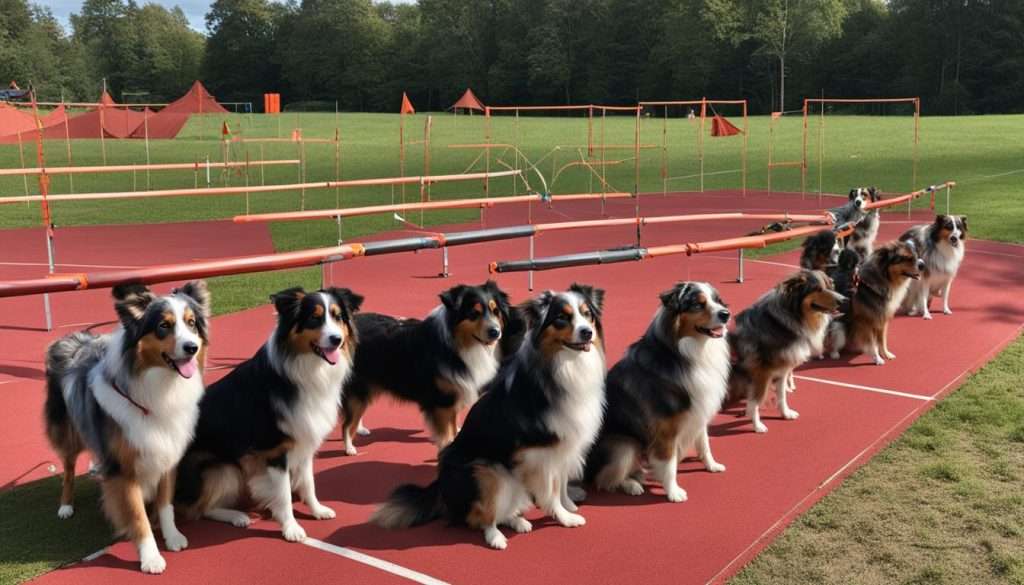
| Training Methods | Benefits |
|---|---|
| Positive reinforcement | – Builds a positive association with training – Encourages desired behaviors – Establishes a strong bond between dog and handler |
| Consistency | – Ensures clear communication – Reinforces the dog’s understanding of commands – Promotes quick and reliable responses |
| Real-life scenario simulations | – Prepares dogs for potential threats – Develops their problem-solving skills – Increases their confidence in real-life situations |
| Professional guidance | – Provides expertise and experience in training security dogs – Ensures safety during training – Addresses specific training needs and challenges |
Factors to Consider When Choosing a Security Dog
When it comes to selecting a security dog for your home or property, several essential factors need to be considered. The right choice will ensure that you have a reliable and effective companion for your security needs. Here are the key considerations:
Breed Characteristics
Each dog breed has its unique characteristics and qualities that make them suitable for specific security needs. Some breeds excel in guarding and protection, while others possess excellent detection abilities. Understanding the breed characteristics will help you choose a dog that aligns with your specific security requirements.
Temperament
An ideal security dog should have a trainable and alert temperament. They should be easily trainable to respond to commands and exhibit a high level of awareness of their surroundings. Look for dogs that are naturally protective and have a strong sense of loyalty.
Size
The size of the security dog is an important consideration. Larger breeds often provide a more physical deterrent due to their size and strength. However, smaller breeds can also be effective, especially in situations where a more discreet security presence is desired.
Compatibility with Family and Lifestyle
It’s crucial to select a security dog that is compatible with your family and lifestyle. Consider factors such as the presence of children or other pets in your household. Some breeds are more patient and gentle with children, while others may have a higher prey drive that may not be suitable for homes with small animals. Evaluate your daily routine and ensure that you can provide the necessary care and attention your security dog requires.
“When choosing a security dog, it’s essential to consider factors such as breed characteristics, temperament, size, and compatibility with your family and lifestyle.”
Training and Socialization
Regardless of the breed, proper training and socialization are vital for a security dog to fulfill their role effectively. Look for dogs that have undergone professional training and have a solid foundation in obedience, protection, and detection. Socialization is equally important to ensure that the dog can interact calmly with people, other animals, and different environments.
Cost and Maintenance
Consider the cost implications and maintenance requirements associated with owning a security dog. Some breeds may require more frequent grooming or have specific health needs that should be taken into account. Additionally, training and ongoing care expenses should be factored into your budget.
| Factors | Considerations |
|---|---|
| Breed Characteristics | Different breeds have varying strengths and qualities that suit specific security needs. |
| Temperament | Look for a dog that is trainable, alert, and naturally protective. |
| Size | Consider the physical deterrent a larger breed may provide or the discreetness of a smaller breed. |
| Compatibility | Evaluate if the dog will fit well with your family and lifestyle, including children and other pets. |
| Training and Socialization | Ensure the dog has undergone professional training and is well-socialized. |
| Cost and Maintenance | Consider the expenses associated with owning a security dog, including training and ongoing care. |
By carefully considering these factors, you can select a security dog that not only meets your security needs but also becomes a loyal and trusted companion for your family.
The Role of Security Dogs in Personal Protection
Security dogs play a significant role in personal protection by acting as a deterrent to potential threats and intruders. Their presence alone can deter criminals from targeting a property. They can alert their owners to danger through their excellent senses and protective instincts. Security dogs can also be trained to physically confront intruders, apprehend suspects, and protect their owners from harm.
The combination of their loyalty, intelligence, and physical abilities makes them highly effective in providing personal protection. Whether it’s a German Shepherd patrolling a property or a Rottweiler watching over a family, security dogs are constantly on guard, ready to defend and keep their owners safe.
Ways Security Dogs Provide Personal Protection:
- 1. Deterrence: The presence of a security dog in a home or business creates a visible deterrent to potential intruders, reducing the risk of break-ins or other criminal activities.
- 2. Alertness: Security dogs possess heightened senses, including acute hearing and sense of smell. They can quickly detect unusual sounds, scents, or movements, alerting their owners to potential threats.
- 3. Protecting Property: Security dogs are trained to patrol and protect a specific area, ensuring the safety of the property and its occupants.
- 4. Apprehending Intruders: Well-trained security dogs can physically apprehend intruders, immobilizing them until authorities arrive.
- 5. Emergency Situations: In emergency situations such as a fire or natural disaster, security dogs can help guide and protect individuals to safety.
Having a security dog provides not only a sense of security but also a loyal companion who is dedicated to the well-being of their owners. Their role in personal protection goes beyond just physical capabilities; they offer peace of mind and an added layer of defense.

The Importance of Proper Care and Maintenance for Security Dogs
Proper care and maintenance are crucial for the overall well-being and effectiveness of your security dog. By following essential care practices, you can ensure that your furry companion remains healthy, happy, and ready to protect you and your property.
Regular Exercise
Regular exercise plays a vital role in keeping your security dog physically fit and mentally stimulated. Engaging in physical activities such as walks, runs, or playtime not only helps maintain their agility but also helps channel their energy in a positive way. A lack of exercise can lead to behavioral issues, so make sure to provide them with enough physical activity.
A Well-Balanced Diet
Proper nutrition is essential for a security dog’s overall health and well-being. Provide them with a well-balanced diet that meets their specific nutritional needs. Consult with a veterinarian to determine the appropriate diet and portion sizes based on factors such as age, breed, and activity level. Remember to provide access to fresh water at all times.
Regular Veterinary Care
Regular veterinary care is vital to maintain your security dog’s health. Schedule regular check-ups, vaccinations, and preventive treatments as recommended by your veterinarian. Routine inspections can help identify any underlying health issues early on, preventing them from developing into more serious problems.
Grooming
Grooming your security dog is not only important for their appearance but also for their overall well-being. Regular brushing helps keep their coat clean and free from tangles, preventing the formation of mats and skin irritations. Additionally, check their ears regularly for any signs of infection and trim their nails to avoid discomfort or injury.
Bonding and Quality Time
Bonding with your security dog is essential for fostering a strong relationship and trust. Spend quality time with them, engaging in activities that they enjoy. Whether it’s training sessions, playtime, or quiet moments of affection, this dedicated time strengthens the connection between you and your loyal companion.
Proper care and maintenance for your security dog are essential to ensure their overall well-being and effectiveness in their protective role.
By providing regular exercise, a well-balanced diet, veterinary care, grooming, and quality time, you can ensure that your security dog remains healthy, happy, and ready to safeguard your home and loved ones.
| Care and Maintenance Practices for Security Dogs |
|---|
| Regular exercise to keep them physically fit and mentally stimulated |
| A well-balanced diet that meets their nutritional needs |
| Regular veterinary care, including check-ups and vaccinations |
| Grooming to keep their coat clean and free from tangles |
| Bonding and spending quality time to foster a strong relationship |
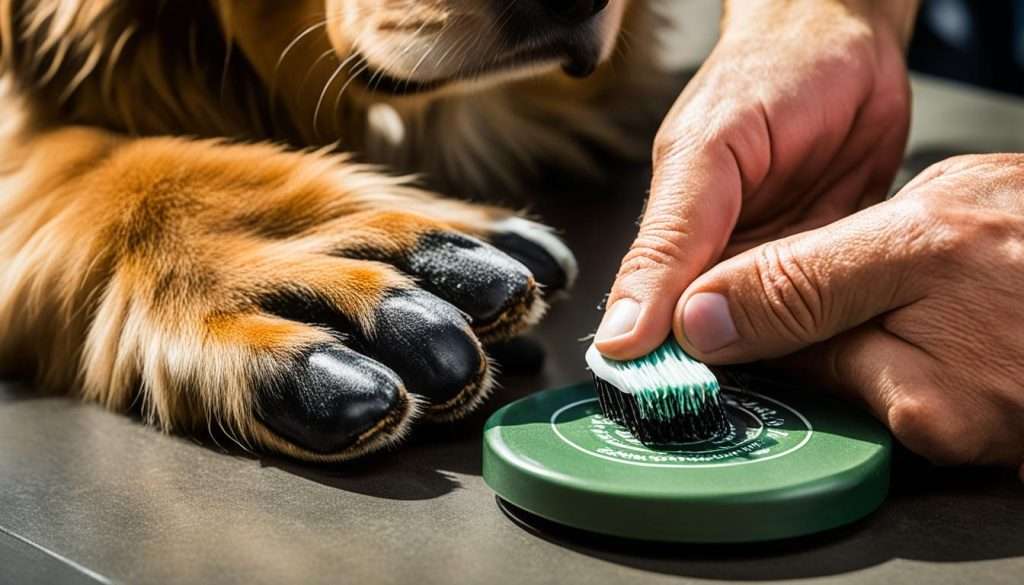
Additional Roles of Security Dogs
Security dogs are not only limited to providing home security; they can also perform a variety of additional tasks and roles. Their versatility and trainability make them valuable assets in different situations and environments. Here are some of the other tasks that security dogs can perform:
1. Sheep Protection
Security dogs can be trained to protect livestock, such as sheep. Their presence helps deter predators and provides a sense of security for the flock.
2. Chicken Protection
With proper training, security dogs can ensure the safety of chickens on a farm or in a backyard. They can help keep predators away and prevent potential harm to the flock.
3. Hunting and Protection
Security dogs can be trained to assist in hunting activities, alerting hunters to the presence of game and providing protection while in the wilderness.
4. Farm Protection
Security dogs can be valuable assets on farms, guarding against intruders and providing an additional layer of security for livestock and property.
5. Wilderness Protection
In remote or wilderness areas, security dogs can help ensure the safety of individuals by providing protection against potential dangers and alerting to any imminent threats.
6. Property Protection
Besides home security, security dogs can also protect commercial properties, warehouses, and other premises, preventing unauthorized access and deterring potential criminals.
7. Personal Protection
Security dogs can offer personal protection to individuals, acting as loyal companions and providing a sense of safety and security in various scenarios.
8. Snake Protection
In regions with venomous snakes, security dogs can be trained to detect and protect against snake bites, potentially saving lives and minimizing the risk of snake encounters.
These are just some of the additional roles that security dogs can fulfill beyond their primary function of home security. With the right training and guidance, these versatile and dedicated dogs can adapt to various tasks, offering invaluable support and protection in different environments.
| Additional Roles of Security Dogs | Description |
|---|---|
| Sheep Protection | Security dogs can protect livestock, such as sheep, by deterring predators. |
| Chicken Protection | Trained security dogs can ensure the safety of chickens and prevent harm. |
| Hunting and Protection | Security dogs can assist hunters and provide protection in wilderness environments. |
| Farm Protection | Security dogs can guard against intruders and provide security for livestock and property on farms. |
| Wilderness Protection | Security dogs help ensure the safety of individuals in remote or wilderness areas. |
| Property Protection | Security dogs can guard commercial properties, warehouses, and other premises. |
| Personal Protection | Security dogs can offer personal protection to individuals, acting as loyal companions. |
| Snake Protection | Trained security dogs can detect and protect against snake encounters. |
These are just a few examples of the additional roles that security dogs can perform. Their versatility, loyalty, and dedication make them indispensable in a range of situations, providing not only security but also peace of mind.
Limitations and Considerations of Having a Security Dog
While owning a security dog can offer numerous benefits for home safety and protection, it’s important to be aware of the limitations and considerations that come with it. Before bringing a security dog into your household, there are several factors to keep in mind to ensure a successful and harmonious partnership.
Consistent Training and Socialization
One of the primary requirements for owning a security dog is the commitment to consistent training and socialization. Security dogs need to undergo specialized training to become effective in their roles and respond appropriately to potential threats. Without proper training, a security dog may not be able to perform its duties effectively, compromising the security of your home.
Socialization is also crucial for security dogs to learn how to interact appropriately with people and other animals. It helps them develop good behavior and prevents aggression towards unfamiliar individuals. Adequate socialization ensures that your security dog can differentiate between potential threats and everyday encounters, reducing the likelihood of unintentional aggression.
Regular Exercise and Mental Stimulation
Security dogs are typically active and energetic breeds that require regular exercise and mental stimulation. Failing to provide adequate physical activity can result in behavioral issues such as excessive barking, chewing, or destructive behavior. These dogs need outlets for their energy to prevent boredom and frustration, which can lead to behavioral problems.
Additionally, security dogs benefit from mental stimulation through training exercises, interactive toys, and problem-solving activities. Engaging their minds helps keep them mentally sharp, satisfied, and balanced. Neglecting their mental needs can result in restlessness and anxiety, which may impact their overall effectiveness as security dogs.
Suitability for Every Household
While security dogs can offer excellent protection, they may not be suitable for every household. Considerations should be given to the presence of small children or other pets in your home. Some security dogs may not have a natural inclination towards being around young children or may not get along well with other animals.
It’s important to assess the temperament and compatibility of a security dog breed or individual dog with your family’s dynamics. Ensuring that everyone feels safe and comfortable around the security dog is essential for maintaining a harmonious living environment.
Long-term Commitment
Ownership of a security dog is a long-term commitment that requires time, effort, and financial resources. These dogs typically have long lifespans, often exceeding 10 years. As their owner, you are responsible for their well-being throughout their lives.
Owning a security dog entails providing appropriate healthcare, regular veterinary check-ups, vaccinations, and proper nutrition. You should also be prepared for the financial responsibility of purchasing high-quality food, toys, grooming supplies, and other necessary equipment.
Furthermore, security dogs require ongoing training and reinforcement of their skills to maintain their effectiveness. It’s important to commit to their continued training and dedicate time to ensure they remain well-behaved, obedient, and prepared to fulfill their security roles.
| Limitations and Considerations of Having a Security Dog |
|---|
| Consistent Training and Socialization |
| Regular Exercise and Mental Stimulation |
| Suitability for Every Household |
| Long-term Commitment |
Finding a Reliable Source for Security Dogs in Australia
When looking to buy a security dog in Australia, it’s important to find a reliable source. Australia’s Best Bodyguards is a reputable provider of personal protection dogs, family guard dogs, security patrol dogs, and truffle detection dogs. They have established themselves as a trusted name in the industry, offering a wide range of well-trained and well-bred security dogs.
At Australia’s Best Bodyguards, they prioritize the quality and temperament of their dogs. They have been selectively breeding and raising security dogs for 45 years, ensuring the perfect balance of strength, loyalty, and intelligence. Their dogs are specifically bred and trained for home security, making them a reliable choice for safeguarding your property and loved ones.
Australia’s Best Bodyguards not only offers papered puppies for security patrol and home guard dog roles, but they also have a rescue and re-home program where you can find different breeds, companion dogs, and assistance dogs for sale from time to time. This program allows you to give a loving home to a dog in need while still benefiting from the added security and protection they provide.
Visiting Australia’s Best Bodyguards’ facility allows you to see the parents of the puppies and discuss their training and characteristics with knowledgeable staff. This firsthand interaction helps you make an informed decision and choose the security dog that best suits your specific needs and requirements.
Buying a security dog is a significant investment, both financially and emotionally. It’s essential to trust the source and have confidence in the quality and integrity of the dogs being offered. Australia’s Best Bodyguards provides a reliable source for security dogs in Australia, ensuring you can confidently choose a loyal and protective companion for your home.
Why Choose Australia’s Best Bodyguards for Your Security Dog?
- 45 years of experience in breeding and training security dogs
- Wide variety of breeds and training options available
- Rescue and re-home program for dogs in need
- Knowledgeable staff to assist in selecting the right dog for your needs
- Strong focus on quality and temperament
- Transparent and trustworthy approach to dog breeding and sales
| Breed | Description | Training | Temperament |
|---|---|---|---|
| German Shepherd | The German Shepherd is a highly intelligent and versatile breed known for its loyalty and protective instincts. They excel in obedience training and can be trained for specific tasks and commands. | Ongoing training and socialization are essential for developing their skills and maintaining their obedience. They can be trained for personal protection, guarding, and other security roles. | Loyal, confident, and courageous. They are known to form strong bonds with their owners and are protective of their family and territory. |
| Rottweiler | Rottweilers are powerful and robust dogs with a natural guarding instinct. They are known for their loyalty and protective nature, making them excellent family guard dogs. | Early socialization and consistent training are essential for Rottweilers. They can be trained for obedience, protection work, and tracking. | Loyal, confident, and self-assured. They are protective of their family and can be wary of strangers, making them an excellent deterrent for potential intruders. |
| Bullmastiff | Bullmastiffs are large and imposing dogs with a gentle and affectionate nature towards their family. They are protective and make excellent guard dogs. | Bullmastiffs require consistent and firm training to control their size and strength. They can be trained for obedience, protection, and tracking. | Gentle, loyal, and affectionate. They are known for their calm and easygoing temperament, making them an ideal family guard dog. |
| Akita | Akitas are courageous, dignified, and loyal dogs. They have a strong protective instinct and are naturally wary of strangers, making them excellent guard dogs. | Akitas require early socialization and consistent training to control their protective instincts and potential aggression towards other animals. | Loyal, independent, and dignified. They are known for their loyalty to their family and their ability to protect them from potential threats. |
| Australian Shepherd | Australian Shepherds are highly energetic and intelligent dogs. They are known for their herding instincts and make excellent guard dogs. | Training is crucial for Australian Shepherds to channel their energy and intelligence effectively. They can be trained for obedience, agility, and herding. | Intelligent, loyal, and protective. They are known for their strong bonds with their families and their willingness to protect them. |
Importance of Safety Measures When Owning a Security Dog
Owning a security dog comes with the responsibility of implementing safety measures to ensure the well-being of both the dog and its owners. By taking the necessary precautions, you can create a safe environment that maximizes the effectiveness of your security dog.
- Securely Fence Your Property: A strong and secure fence is essential to prevent your security dog from escaping and potentially causing harm or damage. Make sure your fence is high enough and without any gaps that the dog can squeeze through.
- Train and Socialize Your Dog: Adequate training and socialization are crucial for controlling your security dog’s behavior and preventing incidents. Enroll your dog in obedience classes and work with professional trainers to ensure it understands commands and behaves appropriately.
- Be Aware of Legal Requirements: It’s important to familiarize yourself with any legal requirements or regulations related to owning a security dog in your area. Some neighborhoods or municipalities may have specific rules or restrictions, such as leash laws or breed restrictions.
- Regular Health Check-Ups: Just like any other pet, security dogs require regular check-ups with a veterinarian to ensure their overall health. Schedule routine visits to monitor their well-being, vaccinations, and address any health concerns promptly.
- Provide Proper Nutrition: Proper nutrition is essential for the health and longevity of your security dog. Consult with a veterinarian to determine the best diet and feeding schedule for your dog’s specific needs.
“Implementing safety measures is crucial when owning a security dog. By securing your property, training and socializing your dog, being aware of legal requirements, and providing regular health care and proper nutrition, you can create a safe and healthy environment for your loyal protector.”
Remember, owning a security dog is a long-term commitment that requires dedication and responsible ownership. Take the necessary precautions to ensure the safety and well-being of your dog and enjoy the peace of mind that comes with having a loyal and protective companion.
A Quick Guide to Safety Measures:
| Safety Measures | Importance |
|---|---|
| Securely Fence Your Property | Prevent the dog from escaping and causing harm or damage. |
| Train and Socialize Your Dog | Control your dog’s behavior and prevent incidents. |
| Be Aware of Legal Requirements | Ensure compliance with local regulations. |
| Regular Health Check-Ups | Maintain your dog’s overall health and well-being. |
| Provide Proper Nutrition | Support your dog’s health and longevity. |
The Rewarding Experience of Owning a Security Dog
Owning a security dog can be a rewarding and fulfilling experience. These dogs provide not only protection but also companionship and loyalty. They become an integral part of the family and offer a sense of security and peace of mind.
Training and working with a security dog can foster a strong bond and trust between the dog and its owner. The process of teaching commands and skills, and seeing the dog execute them flawlessly, brings a great sense of accomplishment and pride. It is truly a rewarding experience to witness the growth and development of your security dog as they become proficient in their protective duties, ensuring the safety of your home and loved ones.
The loyalty and devotion of a security dog make them a valuable addition to any home. Their unwavering dedication to their owner and their innate ability to sense danger make them more than just a pet – they become a trusted companion and an essential member of the family.
Not only do security dogs offer physical protection, but they also contribute to the overall well-being and happiness of the household. Just their presence alone can create a sense of comfort and reassurance. Knowing that your security dog is diligently watching over your home and standing by your side instills a sense of confidence and tranquillity.
Moreover, security dogs can have a positive impact on your mental health and emotional well-being. The companionship and unconditional love they provide can be immensely therapeutic. They are always there to lend an ear or offer a cuddle, providing a source of comfort during stressful or challenging times.
The rewarding experience of owning a security dog extends beyond the immediate benefits of protection and companionship. It becomes a lifestyle—an opportunity to form a unique and profound bond with an intelligent and devoted animal.
| Benefits of Owning a Security Dog |
|---|
| 1. Enhanced home security and deterrence against potential threats |
| 2. Unconditional companionship and loyalty |
| 3. Increased sense of safety and peace of mind |
| 4. Strengthened bond between the dog and its owner |
| 5. Improved mental health and emotional well-being |
In conclusion, owning a security dog brings numerous benefits and a deeply rewarding experience. From the security they provide to the love and companionship they offer, these loyal and protective animals enrich our lives in countless ways. Embrace the opportunity to welcome a security dog into your home and discover the incredible journey that awaits you.
Conclusion
Owning a security dog can greatly enhance home safety and provide peace of mind. The German Shepherd, Rottweiler, Bullmastiff, Akita, and Australian Shepherd are among the best dog breeds for home security in Australia. These breeds possess the necessary characteristics and instincts to protect your property and loved ones.
To ensure the effectiveness and well-being of security dogs, proper training, socialization, care, and maintenance are crucial. Training helps them respond to potential threats, while socialization ensures they interact well with people and animals. Regular exercise, a balanced diet, and routine veterinary care are essential for their overall health and longevity.
While owning a security dog comes with limitations and considerations, finding a reliable source and implementing safety measures can make it a rewarding experience. Consider the specific needs and requirements of your household when choosing a security dog. A well-trained and loyal companion will not only provide protection but also companionship and joy for the entire family.
Take advantage of the benefits that owning a security dog can offer. Enjoy the peace of mind that comes with having a faithful and protective companion by your side.
FAQ
What are the benefits of having a security dog?
Security dogs offer natural protective instincts, loyalty, and keen senses. They can detect threats, alert their owners, and provide a sense of security and peace of mind.
Which dog breeds are best for home security in Australia?
The best dog breeds for home security in Australia are the German Shepherd, Rottweiler, Bullmastiff, Akita, and Australian Shepherd.
How should security dogs be trained and socialized?
Training for security dogs involves obedience training, bite skills development, and scenarios simulating real-life situations. They should be socialized to interact with people and animals without aggression.
What factors should be considered when choosing a security dog?
Factors to consider when choosing a security dog include breed characteristics, temperament, size, and compatibility with your family and lifestyle.
What is the role of security dogs in personal protection?
Security dogs act as a deterrent, alert their owners to danger, and can be trained to physically confront intruders and protect their owners from harm.
How should security dogs be properly cared for and maintained?
Proper care and maintenance for security dogs include regular exercise, a well-balanced diet, regular veterinary care, grooming, and bonding with the dog.
What additional roles can security dogs perform?
Security dogs can be trained for tasks such as sheep protection, chicken protection, hunting and protection, farm protection, and wilderness protection.
What are the limitations and considerations of owning a security dog?
Owning a security dog requires consistent training, time, effort, and financial resources. Compatibility with small children or other pets should be considered, along with legal requirements and regulations.
Where can I find a reliable source for security dogs in Australia?
Australia’s Best Bodyguards is a reputable provider of security dogs, offering a variety of breeds for sale.
What safety measures should be implemented when owning a security dog?
Safety measures include securely fencing the property, proper training and socialization, and adherence to any legal requirements or regulations.
What are the rewards of owning a security dog?
Owning a security dog provides protection, companionship, loyalty, and a sense of security. It can foster a strong bond and enhance the overall well-being of the household.
